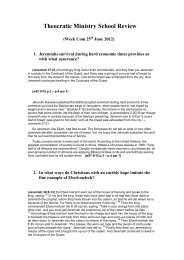1964 Awake! - Theocratic Collector.com
1964 Awake! - Theocratic Collector.com
1964 Awake! - Theocratic Collector.com
You also want an ePaper? Increase the reach of your titles
YUMPU automatically turns print PDFs into web optimized ePapers that Google loves.
y steam, hydroelectric techniques and nuclear<br />
reactors.<br />
Further research with bacteria as an<br />
energy source has resulted in a bioelectric<br />
fuel cell in which inorganic material is<br />
used. This cell has an advantage over the<br />
biochemical fuel cell that uses organic<br />
matter because no heat is generated in the<br />
process. For some uses to which man might<br />
put it, this is desirable. It has two <strong>com</strong>partments,<br />
each with an electrode and a<br />
weak acid solution. An inorganic material<br />
such as pyrite is dropped into one <strong>com</strong>partment,<br />
where the acid frees electrons<br />
and hydrogen. The bacteria in the other<br />
<strong>com</strong>partment attracts the electrons<br />
through a connecting wire. They then consume<br />
the electrons and <strong>com</strong>bine oxygen<br />
with the hydrogen, forming water as a<br />
waste product. The electrons passing along<br />
the wire create a usable electric current.<br />
The development of this bioelectric fuel<br />
cell confirmed the belief that some researchers<br />
had that bacteria use electric<br />
particles for energy rather than the organic<br />
or inorganic materials they break<br />
down. Since the bioelectric fuel cell feeds<br />
bacteria with electrons, almost any type of<br />
bacteria could be used in it.<br />
Essential for Life<br />
As man has gained more knowledge<br />
about bacteria, he has learned of more and<br />
more ways to use them. Although their<br />
role as a producer of electrical power opens<br />
up a large new field of service to man, we<br />
must not overlook the fact that our very<br />
existence is dependent upon bacteria. Without<br />
them we could not live.<br />
16<br />
LE'l"J'BRS (.i.\.LORE<br />
The soil that produces our eatable plants<br />
is fertile because of the bacteria in it.<br />
Without that bacteria no plant could grow,<br />
and that would mean we would have no<br />
food. By producing essential chemical<br />
changes in the soil, bacteria make it possible<br />
for more <strong>com</strong>plex plants to grow.<br />
Among other things, they take nitrogen<br />
out of the atmosphere and put it into the<br />
soil in the form of nitrogen <strong>com</strong>pounds<br />
that green plant life can use. Green plants<br />
are unable to use atmospheric nitrogen.<br />
They must get their nitrogen from the soil<br />
in the form of these <strong>com</strong>pounds.<br />
Phosphorus is also essential for plant<br />
nourishment, but here again bacteria are<br />
required to put it into a form usable by<br />
green plants. The same can be said of iron.<br />
A certain type of bacteria changes iron<br />
into a soluble iron <strong>com</strong>pound that is nourishing<br />
to plants. Still another type of bacteria<br />
makes sulfur available to green<br />
plants from the hydrogen sulfide gas given<br />
off by decaying organic material. Thus it<br />
can be seen that the existence of soil bacteria<br />
is vital for man's existence.<br />
Rather than regard all bacteria as enemies<br />
because a few of them cause sickness,<br />
look upon them as tiny friends that faithfully<br />
serve you. Whether you eat ferment·<br />
ed foods or drink fermented drinks or eat<br />
fruits, nuts and vegetables, you are indebted<br />
to bacteria. Now that these microscopic<br />
plants seem able to give you power<br />
for operating the family car and for lighting<br />
your home, you have further reason<br />
for being grateful to the Creator that he<br />
caused useful bacteria to exist.<br />
• New York City handles more mail than the entire British postal<br />
system, former U.S. Postmaster General J. EdWard Day pointed out.<br />
But even more astounding: "The United States Post Office Department<br />
handles twice as much mail as all the 112 other postal systems in the<br />
world put together."-New York Time8 Magazine, May 6, 1962.<br />
AWAKE!




